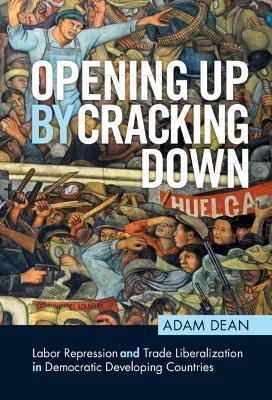
Opening Up by Cracking Down
Labor Repression and Trade Liberalization in Democratic Developing Countries
Seiten
2022
Cambridge University Press (Verlag)
978-1-108-47851-9 (ISBN)
Cambridge University Press (Verlag)
978-1-108-47851-9 (ISBN)
This book develops a novel theory of globalization in developing countries. The author argues that democratic governments used labor repression to overcome union opposition to trade liberalization. The book presents evidence from archival research on Argentina, Bolivia, Mexico, India, and Turkey, as well as cross-national quantitative analysis.
How did democratic developing countries open their economies during the late-twentieth century? Since labor unions opposed free trade, democratic governments often used labor repression to ease the process of trade liberalization. Some democracies brazenly jailed union leaders and used police brutality to break the strikes that unions launched against such reforms. Others weakened labor union opposition through subtler tactics, such as banning strikes and retaliating against striking workers. Either way, this book argues that democratic developing countries were more likely to open their economies if they violated labor rights. Opening Up By Cracking Down draws on fieldwork interviews and archival research on Argentina, Mexico, Bolivia, Turkey, and India, as well as quantitative analysis of data from over one hundred developing countries to places labor unions and labor repression at the heart of the debate over democracy and trade liberalization in developing countries.
How did democratic developing countries open their economies during the late-twentieth century? Since labor unions opposed free trade, democratic governments often used labor repression to ease the process of trade liberalization. Some democracies brazenly jailed union leaders and used police brutality to break the strikes that unions launched against such reforms. Others weakened labor union opposition through subtler tactics, such as banning strikes and retaliating against striking workers. Either way, this book argues that democratic developing countries were more likely to open their economies if they violated labor rights. Opening Up By Cracking Down draws on fieldwork interviews and archival research on Argentina, Mexico, Bolivia, Turkey, and India, as well as quantitative analysis of data from over one hundred developing countries to places labor unions and labor repression at the heart of the debate over democracy and trade liberalization in developing countries.
Adam Dean is an Assistant Professor of Political Science at George Washington University. His first book, From Conflict to Coalition (Cambridge University Press, 2016), was a finalist for the J. David Greenstone Book Prize.
Introduction; 1. Open democracies: how labor repression facilitates trade liberalization; 2. Trade liberalization around the world: cross-national quantitative tests; 3. Democracy is not enough: labor rights and trade policy in Mexico, Argentina, Bolivia, Turkey, and India; 4. India's middle path: preventive arrests and general strikes; 5. Opening Argentina: Menem's repression of the CGT; 6. Conclusion; Appendix; Bibliography.
| Erscheinungsdatum | 27.09.2022 |
|---|---|
| Reihe/Serie | Political Economy of Institutions and Decisions |
| Zusatzinfo | Worked examples or Exercises |
| Verlagsort | Cambridge |
| Sprache | englisch |
| Maße | 158 x 235 mm |
| Gewicht | 450 g |
| Themenwelt | Sozialwissenschaften ► Politik / Verwaltung ► Europäische / Internationale Politik |
| Sozialwissenschaften ► Politik / Verwaltung ► Politische Theorie | |
| Wirtschaft ► Volkswirtschaftslehre ► Wirtschaftspolitik | |
| ISBN-10 | 1-108-47851-4 / 1108478514 |
| ISBN-13 | 978-1-108-47851-9 / 9781108478519 |
| Zustand | Neuware |
| Haben Sie eine Frage zum Produkt? |
Mehr entdecken
aus dem Bereich
aus dem Bereich
Studienbuch
Buch | Hardcover (2023)
De Gruyter Oldenbourg (Verlag)
CHF 62,90
erfolgreiche Interessenvertretung durch Prozesskompetenz im komplexen …
Buch | Hardcover (2023)
Wiley-VCH (Verlag)
CHF 58,75


